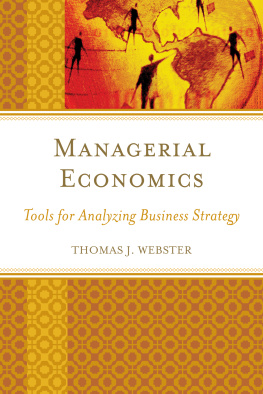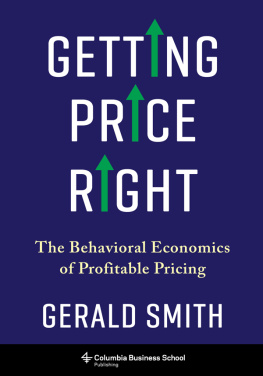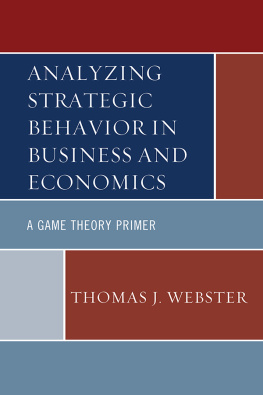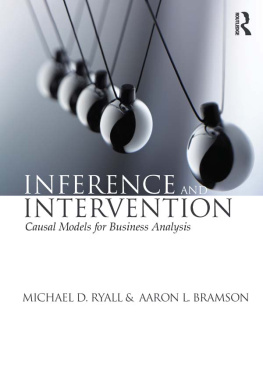Managerial Economics
Managerial Economics
Tools for Analyzing Business Strategy
Thomas J. Webster
LEXINGTON BOOKS
Lanham Boulder New York London
Published by Lexington Books
An imprint of The Rowman & Littlefield Publishing Group, Inc.
4501 Forbes Boulevard, Suite 200, Lanham, Maryland 20706
www.rowman.com
Unit A, Whitacre Mews, 2634 Stannary Street, London SE11 4AB
Copyright 2015 by Lexington Books
All rights reserved . No part of this book may be reproduced in any form or by any electronic or mechanical means, including information storage and retrieval systems, without written permission from the publisher, except by a reviewer who may quote passages in a review.
British Library Cataloguing in Publication Information Available
Library of Congress Cataloging-in-Publication Data
Webster, Thomas J.
Managerial economics : tools for analyzing business strategy / Thomas J. Webster.
pages cm
Includes bibliographical references and index.
ISBN 978-1-4985-0793-6 (cloth : alk. paper) ISBN 978-1-4985-0794-3 (electronic) 1. Managerial economics. 2. Economics, Mathematical. I. Title.
HD30.22.W433 2015
338.5024658dc23
2014043987
 The paper used in this publication meets the minimum requirements of American National Standard for Information SciencesPermanence of Paper for Printed Library Materials, ANSI/NISO Z39.48-1992.
The paper used in this publication meets the minimum requirements of American National Standard for Information SciencesPermanence of Paper for Printed Library Materials, ANSI/NISO Z39.48-1992.
Printed in the United States of America
Contents
Chapter 1
Managerial Economics and Strategy
For many of you reading these words, it is probably safe to say that life after university is just around the corner. If responsibility and leadership is what you are after, perhaps a corporate management position is in the cardsmaybe even a business of your own. While being a successful manager or business owner depends on many factors, both tangible and intangible, the tools and techniques of analysis developed in these pages will help you along the way.
In an important study about the future of MBA programs, Srikant , David Garvin and Patrick Cullen (2010) conducted interviews with dozens of deans from highly ranked business schools in the United States and Europe, and current and former senior business executives from the financial services, consulting, multinational organizations, and high technology industries. Several important insights emerged from these discussions.
According to these business leaders, business schools should train future managers to reassess facts, frameworks, and theories taught in the classroom. There are things that every business leader should know, such as the difference between assets and liabilities, the determinants of an industrys structure, the return on investment, and the four Ps (product, price, place and promotion). Datar, Garvin and Cullen refer to this as the knowing component.
Business leaders also expressed the belief that business schools should also pay more attention to developing the skills, capabilities, and techniques that lie at the heart of the practice of managementwhat Datar, Garvin and Cullen refer to as the doing component. Finally, business schools should endeavor to instill in its students the values, attitudes, and beliefs that form managers world views and professional identitiesthe being component.
The purpose of this text is to contribute to the knowing component. The analytical tools discussed in the pages that follow will help managers understand the limits of models and markets to effectively respond to a rapidly changing business environment to produce optimal bottom line results. By the time you turn the last page of this text, you should have a better understanding of how to effectively respond to the competitive challenges of the marketplace.
THE ROLE OF ECONOMICS IN BUSINESS MANAGEMENT
Unlike courses in accounting, finance, marketing, and management, some business students view courses in economics as too abstract to be of any practical value. Yet, each year, thousands of businesses file for bankruptcy protection because managers failed to efficiently organize the companys operations, misread market trends, allowed product quality to slip, or misinterpreted the activities and intentions of rival companies. Perhaps they failed to formulate optimal advertising or financing strategies, did not procure raw materials and components at least cost, or failed to provide adequate incentives to motivate workers to put forth their best efforts. These are just a few of the topics that will be discussed in this text. A course in managerial economics will not transform a budding entrepreneur into another Warren Buffet (Berkshire Hathaway), Bill Gates (Microsoft), or Mark Zuckerberg (Facebook), but it will help nascent managers identify optimal solutions to common business problems.
What is Economics?
Economics is the study of how individuals, institutions, commercial enterprises, countries, and governments allocate scarce resources amongst competing uses. By scarcity we mean that the output of goods and services is limited because the supply of productive inputs and other resources needed for their production is finite. The ability of managers to maximize shareholder value, for example, may be handicapped by insufficient operating budgets, limited access to finance capital, restrictive government regulations, labor shortages, high interest rates, and a host of other operating constraints.
Understanding the role of scarcity and the need to make choices is central to an understanding of economics and business. Because of scarcity, the decision to undertake a particular course of action is a simultaneous decision to forego alternative opportunities. Since resources are finite, every decision involves sacrifice. Scarcity necessitates trade-offs. The highest-valued alternative foregone whenever a choice is made called opportunity cost . In the marketplace, opportunity costs are reflected in the prices of goods and services. An understanding of economics is useful in business precisely because it helps managers identify profit opportunities in situations involving scarcity and tradeoffs.
What is Managerial Economics?
Managerial economics is the application of economic principles to topics of concern to managers. Managerial economics combines the various business disciplines (such as accounting, finance, marketing, and management) with quantitative methods (such as optimization analysis, game theory, statistics, and forecasting) to find optimal solutions to business problems. The manner in which a manager organizes the firms operations depends on what the firm is trying to accomplish. We typically assumed that the goal of a firm is to maximize profit. The principles and tools of analysis developed in this book will help future managers optimally achieve a firms organizational objectives, whatever they may be.
Managerial economics is concerned with developing a framework for predicting managerial responses to changes in the business environment. Many economists earn a living by advising businesses and government agencies on how best to reach its goals by bringing the real world closer to the ideal outcome hypothesized by economic theory.
Strategic Behavior
Economists assume that decision makers attempt to achieve the best possible outcome subject to scarce resources. Consumers to maximize their material and spiritual well-being given limited incomes and wealth. Firms maximize shareholder value subject to a fixed operating budget and finite human and non-human resources. Analyzing consumer and producer behavior is often simplified by assuming their actions have no effect on the behavior of others. In the real world, however, decisions are often mutually interdependent.
Next page










 The paper used in this publication meets the minimum requirements of American National Standard for Information SciencesPermanence of Paper for Printed Library Materials, ANSI/NISO Z39.48-1992.
The paper used in this publication meets the minimum requirements of American National Standard for Information SciencesPermanence of Paper for Printed Library Materials, ANSI/NISO Z39.48-1992.